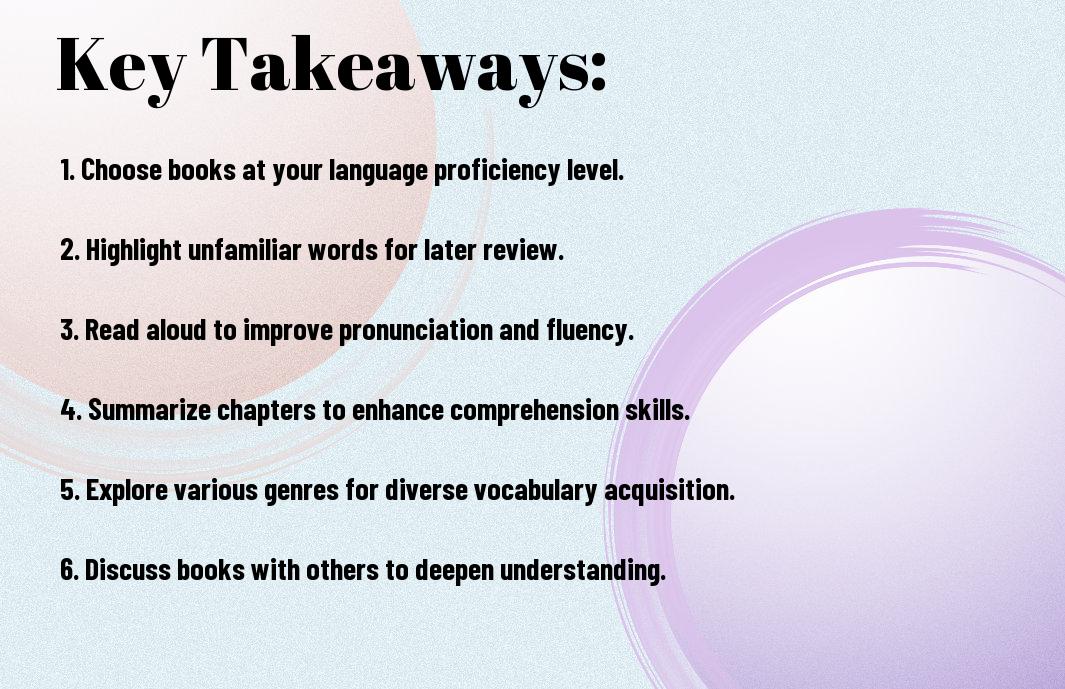You’re about to discover a powerful way to improve your language skills. By reading books in the language you want to learn, you’ll immerse yourself in new vocabulary, grammar, and sentence structures. Your comprehension and pronunciation will improve with each turn of the page. You’ll find that reading books becomes an enjoyable and effective way to learn a new language, and you’ll be motivated to continue your language learning journey.
Key Takeaways:
To learn languages through reading books, consider the following points:
- Start with simple texts and gradually move to more complex materials to build your reading confidence and comprehension skills.
- Choose books with translations or bilingual editions to help you understand unfamiliar words and phrases.
- Focus on vocabulary building by looking up unknown words and phrases, and try to use them in context to improve your language retention.
- Practice active reading by taking notes, summarizing the plot, and discussing the book with others to enhance your language skills and stay engaged.
- Incorporate language learning tools, such as dictionaries, flashcards, or language learning apps, to support your reading and learning process.
Benefits of Learning Languages Through Reading
While learning a language through reading books, you’ll discover numerous benefits. You can learn more about this method at 21 Century: Is It Still Possible To Learn A Language By Reading, and find out how it can improve your skills.
Improved Vocabulary
Languages are learned through exposure to new words, and reading books is an excellent way to achieve this, as you encounter various terms and phrases that expand your vocabulary.
Enhanced Grammar
Beside the advantages of vocabulary expansion, reading helps you understand grammar rules and sentence structures, making you a more proficient language user.
At this point, you should be aware that enhanced grammar is a key aspect of language learning, and reading books will help you internalize grammatical rules, allowing you to express yourself more effectively in your target language, and you will see improvement in your writing and speaking skills as you progress.

Choosing the Right Books
Now that you’re ready to start learning a language through reading, it’s time to select the books that suit your needs. You’ll want to find books that interest you and match your language level.
Selecting Authors and Genres
Besides your personal preferences, consider the authors and genres that will help you learn the language. You can start with simple texts and gradually move to more complex ones, exploring different genres to find what works best for you.
Considering Language Levels
Generally, your language level will determine the type of books you can handle. You should choose books with vocabulary and grammar that are not too daunting, allowing you to understand and enjoy the content.
Hence, as you assess your language level, you’ll be able to find books that challenge you without overwhelming you. You’ll look for texts that offer a balance between difficulty and comprehension, enabling you to learn and improve your language skills effectively. You can start with books that have simpler language and gradually move to more complex texts, ensuring a steady progress in your language learning journey.
Creating a Reading Routine
After establishing your reading goals, you’ll need to create a routine that works for you. Set aside time each day to read, even if it’s just 15-20 minutes. Consistency is key when it comes to language learning through reading.
Setting Goals and Schedules
Along with your routine, you’ll want to set achievable goals and schedules for your reading. Determine how many pages or chapters you’ll read each day, and stick to it. This will help you stay on track and make progress in your language learning journey.
Tracking Progress and Staying Motivated
One way to stay motivated is to track your progress. Keep a log of what you’ve read, note new vocabulary, and reflect on what you’ve learned. This will help you see how far you’ve come and encourage you to keep going.
Consequently, as you track your progress, you’ll begin to notice improvements in your language skills. You’ll start to understand more complex texts, and your vocabulary will expand. To stay motivated, reward yourself when you reach certain milestones, such as finishing a book or completing a challenging chapter. This will help you stay engaged and committed to your language learning goals, and you’ll find that reading becomes an enjoyable and rewarding experience.
Overcoming Language Barriers
All language learners face barriers when reading books in a foreign language. You will encounter unfamiliar vocabulary, complex grammar, and confusing expressions. However, with persistence and the right strategies, you can overcome these barriers and improve your language skills.
Using Dictionaries and Translations
One of the most effective ways to overcome language barriers is to use dictionaries and translations. You can look up unknown words, phrases, and expressions to understand their meanings and context, helping you to better comprehend the text.
Practicing Active Reading Techniques
With active reading techniques, you can engage more deeply with the text and improve your comprehension. You will learn to identify main ideas, make inferences, and draw conclusions, all of which will help you to become a more proficient language learner.
At this stage, you are ready to take your reading skills to the next level. As you practice active reading, you will find that your ability to understand and interpret complex texts improves dramatically, allowing you to tackle more challenging books and expand your language skills even further, and you will start to see significant progress in your language learning journey.

Engaging with the Material
Not only will reading books help you learn a new language, but it will also keep you engaged and motivated. You’ll start to look forward to your daily reading sessions, eager to find out what happens next in the story or to learn new facts and information.
Taking Notes and Summarizing
On the path to learning a language, taking notes and summarizing what you’ve read is imperative. You’ll be able to track your progress, identify areas where you need improvement, and solidify new vocabulary and grammar rules in your mind.
Discussing with Others and Joining Communities
With the help of online forums and social media, you can connect with other language learners and native speakers. You’ll be able to get feedback on your progress, ask questions, and stay motivated with the support of like-minded individuals.
With this support system in place, you’ll find that your language skills improve rapidly. You’ll be able to discuss the books you’ve read with others, sharing your thoughts and opinions, and learning from their insights and perspectives. This will not only help you improve your language skills, but also give you a deeper understanding of the material and its cultural context.
Measuring Progress and Setting New Goals
Despite the challenges you may face, tracking your progress is imperative to learning a language through reading books. You’ll be able to identify areas that need improvement and set achievable goals.
Evaluating Language Skills
On occasion, take a step back to assess your language skills. You’ll notice improvements in comprehension, vocabulary, and grammar, which will help you refine your reading strategy.
Adjusting Reading Strategies
About halfway through your learning journey, you may need to adjust your approach. You can try different genres, authors, or difficulty levels to keep your reading engaging and challenging.
In addition to adjusting your reading strategies, you’ll find that your learning pace and style may also evolve. As you become more comfortable with the language, you can tackle more complex texts, explore different topics, and develop a more nuanced understanding of the language, allowing you to refine your goals and continue making progress in your language learning journey.
To wrap up
As a reminder, you’ve learned that reading books is a simple yet effective way to improve your language skills. You’ve discovered how to choose the right books, set goals, and track your progress. By applying these tips, you’ll enhance your vocabulary, grammar, and comprehension. Your journey to mastering a new language will be enjoyable and rewarding, and you’ll become a proficient reader in no time, unlocking a world of knowledge and opportunities.
FAQ
Q: What are the benefits of learning languages through reading books?
A: Learning a language through reading books can be highly effective as it exposes you to a wide range of vocabulary, grammar, and sentence structures in context. As you read, you’ll encounter different writing styles, genres, and topics, which can help you develop a deeper understanding of the language and its nuances. Moreover, reading books can improve your comprehension, vocabulary, and pronunciation, allowing you to become more confident and fluent in the language. By starting with books that match your current level and interests, you can make steady progress and stay motivated in your language learning journey.
Q: How do I choose the right books for language learning through reading?
A: Choosing the right books is crucial for effective language learning through reading. Start by selecting books that align with your current language level, whether you’re a beginner, intermediate, or advanced learner. You can choose books from various genres, such as fiction, non-fiction, or a combination of both, depending on your interests. Look for books with simpler language and shorter sentences if you’re a beginner, and gradually move to more complex texts as your skills improve. You can also consider books with translations or bilingual editions to help you understand difficult passages. Additionally, join online book clubs or language learning communities to discuss your progress and get recommendations from fellow learners.
Q: What strategies can I use to get the most out of reading books for language learning?
A: To maximize your language learning through reading, use a combination of strategies. Begin by setting achievable goals, such as reading a certain number of pages or chapters per week. As you read, take notes on new vocabulary, idioms, and phrases, and look them up in a dictionary to understand their meanings and usage. You can also create flashcards or use language learning apps to help you memorize new words. Furthermore, practice active reading by summarizing the plot, identifying main characters, and analyzing the author’s writing style. Discussing what you’ve read with a language exchange partner or tutor can also help you improve your speaking and listening skills, while reinforcing your understanding of the language.

